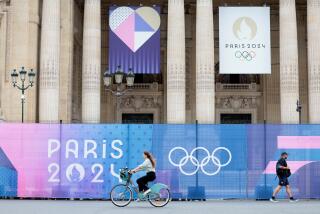With rental bikes, city is exploring a new ‘cycology’
- Share via
PARIS — The Tour de France hasn’t arrived yet, but the bicycles have. Paris is awash in two-wheelers, thousands of taupe bicycles that are part of a plan by City Hall to get people out of their cars and onto more eco-friendly transportation.
The bicycle rental service still has some kinks to work out, but the first week of the Velib program was a big hit with Parisians. City Hall reported 45,000 rentals a day and counting.
“It’s superb,” said IT engineer Olivier Lemaitre, 35, who rode a bike from Les Invalides on the left bank of the Seine to La Madeleine on the right. “I used to come by Metro, but it’s better to be outside.”
“It’s healthier and the weather is beautiful,” science writer Sophie Antoine, 29, said, taking her purse out of the metal basket on the front of the bike.
Mayor Bertrand Delanoe launched the program to alleviate traffic jams and parking problems. The city has placed more than 10,000 bicycles at about 300 stations around the capital. Riders can buy an annual pass for 29 euros (about $40) or pay a euro on the spot to use a bike for half an hour, which is long enough to get almost anywhere in central Paris and park at another station.
The price goes up with time -- another euro for an additional half-hour, two euros for the third and four euros for the fourth. The idea is to keep the bikes in circulation as transportation.
But cyclists have encountered a few bottlenecks. Lemaitre and Antoine couldn’t find parking for the bicycles they were trying to return and had to rush off to other stations to look for a place before the clock ran out.
Management consultant Jean Marc Baron, 50, rented a bike to go out for drinks with friends in the 17th arrondissement the other night. When they finished, he said, “there weren’t any bikes to ride home and we all ended up walking.”
Graphic designer Olivier Patte lives at the top of hilly Montmartre, and his station is often empty when he goes looking for a bike.
“Everyone goes down and no one wants to ride the bike up the hill,” said Patte, 30. “The bikes are all at the bottom.”
The city has trucks to move the bicycles from one station to another, but officials say they need time to learn the traffic patterns.
Another problem, Patte said, is taxi drivers.
“The taxis really don’t like us,” he said. “They stick close to us so we can’t turn right or left. We are in their bus lanes and they don’t like it.”
There are, of course, the universal hazards for cyclists: erratic drivers and sudden stops. Car doors opened without warning. Wind and rain. Police who insist on enforcing the law. (No riding on sidewalks, no going the wrong way on one-way streets, alors.)
No bike accidents were reported in the first week and, in fact, very few bicycle accidents are reported in Paris each year. In 2005, for example, bicycles accounted for only 5% of all traffic accidents, compared with 50% for motorbikes. Three people were killed in bike accidents that year, the latest for which there are figures.
The bikes come without helmets, which are not required in Paris. And not wanted, it seems. Not a single rider of the scores observed Friday was wearing a helmet or appeared to want one.
“What about a helmet?” businessman Xavier Barroux was asked as he fiddled with a bicycle lock in a business suit the color of creme brulee.
“Ah, yes, it’s a good question,” he answered.
“And?”
“And I want to make it simple. I don’t want to carry one.”
Le Figaro newspaper has been a bit snippy about the enterprise, which is new to Paris but ongoing in cities such as Barcelona, Spain; Geneva; Stockholm; and Vienna. In an editorial, the paper said it would take more than bicycles to solve Paris’ traffic and pollution problems, and criticized the city for focusing on bulky three-speed bicycles.
“Paris is not Amsterdam,” the newspaper said, noting that the French capital is not flat and that perhaps its chic population won’t be too happy cycling to business meetings.
“An electric bike, which would prevent arriving at an appointment all sweaty, may have more future as an alternative,” Le Figaro said.
But city officials are bullish on the bikes. They say that Velib -- short for velo libre, “free bike” -- a public-private partnership, will have more than 20,000 bicycles on the streets by the end of the year and triple the number of parking stations.
Renters can send away for an annual pass or buy daily, weekly and annual passes from machines at the stations. More than 17,000 annual passes already have been sold. The machines, which work with credit or debit cards, look much like ATMs but are a bit more complicated. It took new riders awhile to get the hang of things: They must swipe their card over the bike lock to take a bike and swipe it again when returning the bike.
Renters must give a credit card or check deposit of 150 euros, which is collected only if the bike is not returned. Cyclists are responsible for any stolen bikes, though if they report the theft to police the price goes down from 150 euros to 35. So far, none of the bicycles has been stolen, according to a City Hall spokeswoman.
Bike riders find that amazing -- and one of the benefits of renting.
“My son has had three bikes stolen this year,” tour guide Marie Angel Denmory, 50, said as she rolled up her pant leg for a cross-river trek. “Mine was stolen a long time ago. It’s much better to rent.”
--
Times staff writer Achrene Sicakyuz contributed to this report.
More to Read
Sign up for Essential California
The most important California stories and recommendations in your inbox every morning.
You may occasionally receive promotional content from the Los Angeles Times.










